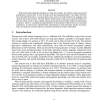Free Online Productivity Tools
i2Speak
i2Symbol
i2OCR
iTex2Img
iWeb2Print
iWeb2Shot
i2Type
iPdf2Split
iPdf2Merge
i2Bopomofo
i2Arabic
i2Style
i2Image
i2PDF
iLatex2Rtf
Sci2ools
MT
1998
1998
A Controlled Skip Parser
Real-world natural language sentences are long and complex, and always contain unexpected grammatical constructions. It even includes noise and ungrammaticality. This paper describes the Controlled Skip Parser, a program that parses such real-world sentences by skipping some of the words in the sentence. The new feature of this parser is that it can control its behavior to find out which words to skip, without using domain-specific knowledge. Statistical information (N-grams), which is a generalized approximation of the grammar learned from past successful experiences, is used for the controlled skip. Experiments on real newspaper articles are shown, and our experience with this parser in a machine translation system is described.
Related Content
| Added | 22 Dec 2010 |
| Updated | 22 Dec 2010 |
| Type | Journal |
| Year | 1998 |
| Where | MT |
| Authors | Kenji Yamada |
Comments (0)

